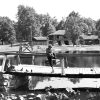calsfoundation@cals.org
Fred Akers (1938–2020)
Arkansas-born Fred Akers was a Hall of Fame college football coach whose playing career at the University of Arkansas (UA) in Fayetteville (Washington County), as well as his coaching career at the University of Texas (UT), spanned some of the most notable years in Southwest Conference football history.
Freddy Sanford Akers was born on March 17, 1938, in Blytheville (Mississippi County), one of nine children of Orley Hilmer Akers and Edna Lee Wilson Akers. He was also raised by a guardian, Mitchell Johns. Akers grew up in Blytheville and graduated from Blytheville High School before receiving a scholarship to play football at UA.
Akers was a star during his playing career at UA, playing halfback and handling the kicking and punting duties under Coach Jack Mitchell, who had recruited him, and then under his successor Frank Broyles. Akers’s field goal to beat Texas Christian University (TCU) 3–0 in 1959 is seen by many as a critical turning point in Broyles’s celebrated tenure as head coach of the Razorbacks. After graduating from UA in 1960, Akers served as a graduate assistant at his alma mater before entering the high school coaching ranks. He married Diane Inmon on March 5, 1961; the couple had two daughters, Stacey and Lesli, and a son, Danny.
After a season as an assistant coach at Port Arthur, Texas, he became one of the youngest high school football head coaches in the state when he took over the program in Edinburg, Texas, at the age of twenty-four. He compiled a record of 19–9–1 in three seasons before posting a record of 7–3 at Lubbock High School.
His work caught the eye of the legendary UT coach Darrell Royal, who hired him as an assistant coach prior to the 1966 season. Akers played an important role for the Texas teams of the coming decade, serving as an assistant from 1966 through 1975, a period during which the Longhorns were twice crowned national champions, in 1969 and 1970. By the end of his tenure, Akers was the team’s offensive coordinator.
After nine seasons on Royal’s staff, Akers felt he was ready to helm his own program, and in 1975 he took over at the University of Wyoming. Although the team initially struggled, finishing 2–9 in his first season, Akers led the Cowboys team to an 8–4 record in 1976. The team shared the Western Athletic Conference crown while earning a berth in the Fiesta Bowl, with eight freshmen starting. Akers was named conference coach of the year.
Following his successful stint at Wyoming, and with UT looking for someone to fill the vacancy left by Royal’s retirement after twenty seasons and three national championships as head coach, the UT leadership chose Akers to try and revive the program, which had slumped a bit at the end of Royal’s tenure.
Leading a new staff and switching to an “I formation” to take advantage of the talents of running back Earl Campbell, Akers led the Longhorns to eleven regular-season wins in 1977, despite starting eight sophomores on defense. The quest for a national championship was derailed when the Longhorns fell to Notre Dame in the Cotton Bowl, but it was nevertheless an impressive start to his decade-long tenure as UT head coach, one in which he compiled a record of 86–31–2. But for all his success, Akers was unable to win a national championship—a 10–9 loss to Georgia in the Cotton Bowl likely prevented the team from doing so in 1983—and following a disappointing 5–6 record in 1986, the school’s first losing record in thirty years, Akers was fired.
Moving on from Texas, Akers served as the head coach at Purdue in West Lafayette, Indiana, for four seasons before retiring after the 1990 season. Akers compiled an overall record of 108–75–3 in his sixteen seasons as head coach at Wyoming, Texas, and Purdue. His accomplishments earned him many honors, including membership in the University of Arkansas Sports Hall of Honor, as well as the halls of fame at Wyoming and Texas. He was also inducted into the Texas Athletics Hall of Honor and the Cotton Bowl Hall of Fame. Following his retirement, he and his wife settled in Horseshoe Bay, Texas. In retirement, Akers remained active as a motivational speaker.
Akers died at his home in Horseshoe Bay on December 7, 2020, of complications due to dementia.
For additional information:
Allen, Nate. “Akers Saw Rivalry from Unique Perspective.” Whole Hog Sports, December 12, 2020. https://www.wholehogsports.com/news/2020/dec/12/akers-saw-rivalry-unique-perspective/ (accessed August 5, 2025).
“Obituary: Freddy Sanford Akers, March 17, 1938–December 7, 2020.” Dignity Memorial. https://www.dignitymemorial.com/obituaries/lakeway-tx/freddy-akers-9936177 (accessed August 5, 2025).
Slaughter, George. “Frederick Sanford Akers (1938–2020).” Handbook of Texas Online. https://www.tshaonline.org/handbook/entries/akers-frederick-sanford (accessed August 5, 2025).
William H. Pruden III
Raleigh, North Carolina






Comments
No comments on this entry yet.